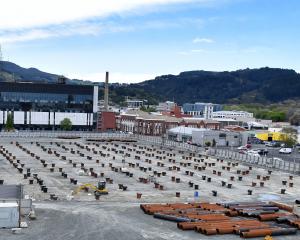WARNING: This story contains details that may be upsetting to some readers.
As a mix of light and dark steam begins rising from Whakaari’s crater, a group of tourists look on in awe.
"Whoa," one of them says. Phones come out and a lady immediately raises her iPad, flipping open the cover to film the billowing cloud. Others turn around to see what all the fuss is about, while a tour guide steps back in shock, pointing at the plume.
But, it takes just seconds for the group to realise this isn’t a spectacle, but a terrifying plume of steam and gas as hot as 100C which will be upon them within moments.

"Hurry up," says one man. "Move, move, move," a tourist with an American accent yells at the same time as the seriousness of the situation sets in among the tourists.
Walking turns to running and running turns to sprinting as the group quickly takes refuge from volcanic missiles behind large rocks.
Panicked screams fill the air and one tourist falls to their hands and knees before the ash cloud engulfs the group.
Today, during the first day of the trial of six defendants involved in tourism on Whakaari, the court was shown several videos of the moment the eruption began on December 9, 2019. As the raw footage - filmed by the tourists - was played, the courtroom fell silent.
Those on the island were either tourists or tour guides. The majority were Australian citizens who were part of a tour group from the Ovation of the Seas cruise ship berthed in Tauranga.
A total of 22 people died while 25 were injured, with many still experiencing the harrowing effects of their injuries today.
The island sat at Volcanic Alert Level 2 at the time - a fact shared by a guide in another raw video played to the court today.
"The higher the level, the higher the risk of an eruption," he tells a tourist as they walk towards the crater. "We’re at Level 2, nearing Level 3 now."
Volcanic Alert Level 2 is defined as ‘moderate to heightened unrest’. Level 3 is a ‘minor volcanic eruption’.
Acting for WorkSafe, lawyer Kristy McDonald KC this morning opened her case at the Auckland District Court.
Six individuals or organisations are facing charges under the Health and Safety at Work Act (HSWA). They are alleged to have failed to take adequate steps to prevent serious injury or death. Others charged have already pleaded guilty and await sentencing.

Their company, Whakaari Management Ltd (WML), is also on trial. WML has arrangements with multiple tourism businesses that operated tours to the island. No tours have taken place since the eruption.
Giving her opening address, McDonald told Judge Evangelos Thomas that the events of December 9 could not have been predicted - but the fact the volcano could erupt at any time should have been foreseen.
"The businesses making their money from tours on to the volcano had clear duties under HSWA. They failed to comply with those duties, and the end result was that tourists and workers went to the crater of an active volcano without being advised properly of the risk.
"The world saw those risks play out in the most dramatic way on December 9."
WorkSafe’s case is that the island’s management did not adequately assess the risk the volcano posed. This was the responsibility of WML - solely directed by the Buttle brothers. WML did not employ any staff.
McDonald spoke of the lack of evacuation measures on the island. Emergency evacuations relied on the island’s wharf, which was nearing 100 years old.
She said WML left responsibility for a new wharf to Ngāti Awa, which applied to the Provincial Growth Fund for funding and was unsuccessful. WML did provide some funding for a breakwater, but this washed away within a week.
Evacuation via helicopter was not realistic, she said, which was proven by the helicopter destroyed during the eruption.
Otherwise, a steel container contained emergency supplies and an area to take refuge. McDonald questioned whether, when exposed to temperatures as high as 200C, a steel container was a safe place to be.
"The limited things WML did in terms of infrastructure fell well short of their duty to ensure there was an adequate mechanism for evacuation.
"Profit should never come before safety."
She said the business was making around $1 million in profit annually - very little of which was invested into infrastructure. She said this again showed the Buttles weren’t aware of the risks of their business.
The company had the opportunity to contract GNS to undertake a risk assessment on the risk to life - which the Department of Conservation does with Mt Tongariro - but did not take up the offer, McDonald said.
Operators did not warn tourists - WorkSafe
Multiple tourism operators had exclusivity agreements to operate tours on Whakaari. Two of those businesses, Tauranga Tourism Services Ltd and ID Tours New Zealand Ltd, were part of the "supply chain" offering tours to prospective tourists - many from visiting cruise ships berthing in Tauranga.
Both companies are facing charges in this trial.
McDonald said this supply chain failed, with none of the tourists coming off the Ovation of the Seas on that fateful day being provided with information about the risks posed in order to make an informed choice.
"Information regarding cancellations due to weather or information for invoicing purposes passed through the supply chain successfully. Safety information was not given the same attention."
"The case is not that the information received was inadequate," McDonald said. "Those passengers did not receive any information in terms of volcanic activity."
She said several Ovation passengers had since said if they were made aware of the risks involved, they wouldn’t have visited the volcano.
The trial is set down for 16 weeks.












